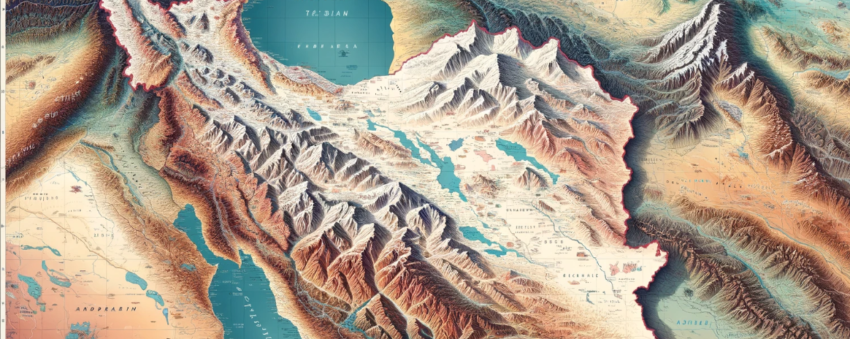| Listen to our audio presentation: Global Nuclear Proliferation |
An incident in the remote mountains of Northern Iran has left the country reeling. The crash of an ageing Bell 212 helicopter claimed the lives of nine individuals, including Iranian President Ebrahim Raisi and Foreign Minister Hossein Amir-Abdollahian. As the nation mourns, questions are swirling about what led to this tragic event.
The crash occurred on Sunday morning amidst thick fog, complicating rescue efforts. By the time the fog cleared and the sun rose on Monday, a drone discovered the charred remains of the helicopter, leaving “no signs of life,” according to state media. The aircraft “hit the mountain and disintegrated” upon impact, a scene that left no hope for survivors.
One of the most pressing questions concerns the helicopter’s transponder, a device that sends out vital information about the aircraft’s height and location. Turkish Transport Minister Abdulkadir Uraloğlu revealed that there was no signal from the transponder. “Most likely, the transponder system was turned off or that the helicopter did not have one,” he surmised. This raises further suspicions about the aircraft’s age and maintenance, especially given reports that officials had previously urged the Iranian government to purchase newer Russian helicopters to replace its ageing fleet.
Former Foreign Minister Mohammad Javad Zarif cited U.S. sanctions as a contributing factor, making it difficult for Iran to purchase spare parts for their helicopters. “The crash will be recorded in the blacklist of American crimes against the Iranian nation,” Zarif declared.
Information Box
– Aircraft Involved: Bell 212, known for its two-blade configuration and capability to carry up to 15 people.
– Transponder Function: A transponder sends out crucial location and height data, essential for safe air travel.
– Previous Concerns: A memo urged Iran to update its fleet, reflecting long-standing worries about aircraft maintenance.
– US Sanctions: Have complicated Iran’s ability to purchase aircraft parts, contributing to reliance on older fleet.
– Weather Conditions: Thick fog hampered rescue efforts, a key factor in the subsequent recovery efforts delayed.
Vladimir Putin, the Russian leader, called Raisi an “outstanding politician,” while Ayatollah Ali Khamenei described him as a “sincere and valuable servant.” Raisi was seen as a potential successor to the 85-year-old Supreme Leader, making his sudden death a significant blow to the regime.
However, not all reactions were somber. The death of Raisi was met with mixed emotions across Iran. While loyalists obeyed Ayatollah Khamenei’s call to pray and mourn, opposition forces saw an opportunity to express their dissatisfaction with the regime. Persian social media buzzed with dark humor, jokes, and even celebrations. Some posts echoed sentiments from the 2022 “Woman, Life, Freedom” protests, viewing Raisi’s death as inevitable justice rather than a tragedy.
British Security Minister Tom Tugendhat took a starkly different stance. “President Raisi’s regime has murdered thousands at home, and targeted people here in Britain and across Europe. I will not mourn him,” he stated on X, formerly known as Twitter.
The death of Raisi leaves Iran facing an uncertain political future. Muhammad Mokhber, previously the first vice president, has been appointed interim president. Mokhber now bears the weighty responsibility of steering the country towards new elections, set to occur within 50 days. This rapid timeline underscores the urgency with which the Iranian government is addressing the sudden leadership vacuum.
Interestingly, Mokhber’s own political career is not without controversy. He led a multibillion-dollar charitable conglomerate under Ayatollah Khamenei for 14 years and was similarly sanctioned by the EU in 2010 over Iran’s nuclear activities. While he was removed from the sanctions list two years later, his association with the regime raises questions about his ability to unify the fractured nation.
While regime loyalists prepare for official mourning and funeral services, an air of uncertainty and tension prevails among Iran’s populace. With a firm response from judiciary officials promising prosecution for those who celebrate Raisi’s death, the situation remains highly polarized. A large segment of the population remains apathetic, believing that the Supreme Leader’s power far outweighs any change in the presidential office.
Going forward, the regime will have to navigate both internal political dynamics and the external pressures resulting from international relations and sanctions. The outcome of the upcoming elections will be pivotal, not just for leadership in Iran, but for its future political landscape and role on the global stage.
References:
1. The Guardian – No signal from helicopter that crashed killing Iran’s president, Turkish minister says.
2. BBC Persian – How Iranians reacted to president’s helicopter crash.
3. Al Jazeera – Who is Mohammad Mokhber, Iran’s interim president?
4. Tehran Times – Iran lost sincere and valuable servant: Leader

